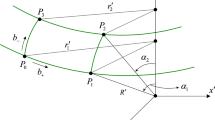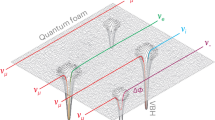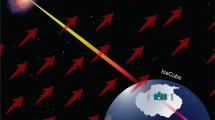Abstract
THE neutrino theory of light is based on a fundamental hypothesis of Jordan1, according to which the emission of a photon must be considered either as emission of two 'coherent' (parallel) particles—neutrino and antineutrino—or as a kind of neutrino Raman effect, without change of direction. This hypothesis permitted Jordan to construct, in the one-dimensional case, the Bose amplitudes required for photons, from the neutrino amplitudes which satisfy the Fermi statistics.
This is a preview of subscription content, access via your institution
Access options
Subscribe to this journal
Receive 51 print issues and online access
$199.00 per year
only $3.90 per issue
Buy this article
- Purchase on Springer Link
- Instant access to full article PDF
Prices may be subject to local taxes which are calculated during checkout
Similar content being viewed by others
References
Jordan, P., Z. Phys., 93, 464 (1935).
cf. Jordan, P., and Kronig, R. de L., Z. Phys., 100, 569 (1936).
Sokolow, A., NATURE, 139, 1071 (1937).
cf. Sokolow, A., “On the Neutrino Theory of Light (three dimensional case)”, Phys. Z. Sovjetunion, in the press.
Author information
Authors and Affiliations
Rights and permissions
About this article
Cite this article
SOKOLOW, A. Neutrino Theory of Light in Three Dimensions. Nature 140, 810–811 (1937). https://doi.org/10.1038/140810b0
Published:
Issue Date:
DOI: https://doi.org/10.1038/140810b0
This article is cited by
-
Connexion between Electromagnetic and Neutrino Fields
Nature (1938)
Comments
By submitting a comment you agree to abide by our Terms and Community Guidelines. If you find something abusive or that does not comply with our terms or guidelines please flag it as inappropriate.



